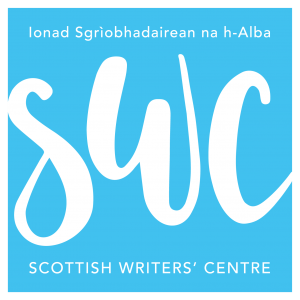Haud yer tongue or gie it laldie? Thoughts on writing in Scots – SWC Member’s Webpost by Tony Beekman #3
(Previous Webpost from Tony Beekman: Having a go & Mostly true except for the made-up bits.)
When I was a wean, I was conscious that there was a natural way I spoke with the family and another “proper” way for speaking outside. With the family, I lived at hame in a hoose, not at home in a house as I would say in primary school.
It was a liberation to discover that forms such as hoose and hame are not modern slang but centuries-old versions of the words that were present in Old English. By the same token, it was disconcerting to learn that men of letters in the eighteenth century like David Hume, the philosopher, had their work edited to eliminate “Scotticisms”.
At secondary school, I was fair chuffed when our English teacher gave us the option to study Sunset Song for the Higher exam. Lewis Grassic Gibbon beautifully captured the verve and expressiveness of the Scots tongue. That same tongue showed no mercy in exposing the domestic oppression that could go on behind closed doors or in decrying the wider constraints of the class system and the jingoistic rush to the First World War.
In 1988, I was delighted to purchase a copy of the Pocket Scots Dictionary. I now have a copy of the Concise Scots Dictionary, in reality a hefty tome even though it contains only a fraction of the entries in the online Dictionary of the Scots Language. This decades-long scholarly project is an excellent resource for anyone setting out to read and/or write in Scots.
The section of the dictionary on the history of Scots points out that it was for many years the language of the royal court and that of poets or makars respected across Europe. In the year 2000, Matthew Fitt demonstrated the continuing versatility of the tongue when his But n Ben A-Go-Go was published. This was the first science fiction novel written entirely in Scots.
For several years now, I have been writing in Scots myself through the Scots Language Society and its twice-yearly publication Lallans. A few issues ago, I contributed a story called Babeledonia. This covers the sweep of history leading to the development of Scots. Scotland invites Norman nobles to take land. The nobles bring their Angle retainers to handle tiresome work like trading and so the language of the Angles spreads. Scots adapt this, transforming it into a distinct language in itself. I ground these developments in the character of a Gaelic-speaking cook returning from Latin prayers in church to prepare a meal for a French-speaking Norman, supervised by an Angle confusing her with a changing form of English/Scots.
Scots, English, mixtures of both, Gaelic and many other influences are all elements of our social and linguistic heritage. Borrowing from that heritage can only enrich our writing. Scrievin in Scots is very much pairt o this so, if ye fancy haein a go, dinnae haud yer tongue – gie it laldie!




